DR CONGO DIGEST – SEPT 2016
POLITICS | ARMED CONFLICT | ECONOMY / MINING /NATURAL RESOURCES | SOCIETY
SUMMARY. DR Congo continues to suffer repeat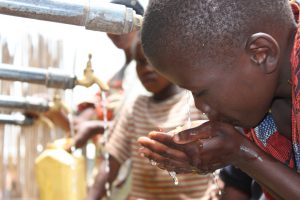 ed bouts of unrest since President Joseph Kabila announced that elections scheduled for late-2016 will be delayed. Opposition parties and activists have attempted to organize a nationwide day of protest against Kabila’s rule, observed mostly in Kinshasa, which saw at least 50 people killed and opposition headquarters burned. While Kabila’s backers announced an agreement on the timing of a mid-2018 election with some opposition members, most major opposition parties have boycotted any discussions and continue to call on Kabila to step down later this year. Meanwhile, the United States sanctions two senior security officials who are allies of Kabila, while NGO groups such as Human Rights Watch and Amnesty International voice increasing concern regarding the faltering political process and rising violence and government repression.
ed bouts of unrest since President Joseph Kabila announced that elections scheduled for late-2016 will be delayed. Opposition parties and activists have attempted to organize a nationwide day of protest against Kabila’s rule, observed mostly in Kinshasa, which saw at least 50 people killed and opposition headquarters burned. While Kabila’s backers announced an agreement on the timing of a mid-2018 election with some opposition members, most major opposition parties have boycotted any discussions and continue to call on Kabila to step down later this year. Meanwhile, the United States sanctions two senior security officials who are allies of Kabila, while NGO groups such as Human Rights Watch and Amnesty International voice increasing concern regarding the faltering political process and rising violence and government repression.
On the security front, South Sudanese fighters loyal to sacked Vice-President Riek Machar fled across the border into DR Congo following a political break and intense violence between factions loyal to Machar and President Salva Kiir. The men have been disarmed and cared for by MONUSCO, but Congolese officials say the fighters are a security risk. The Allied Democratic Forces (ADF) rebel group also launches an attack in the Beni region of North Kivu, while the WHO says a Yellow Fever outbreak in DR Congo is ‘under control’ after a mass vaccination project.
POLITICS
Main border crossing for Congo copper exports closed as riots kill three
Three people have been killed in riots near a border crossing between DR Congo and Zambia that serves as the main export route for Congolese copper, DR Congo’s government says. Clashes between young protesters and police broke out in the Congolese town of Kasumbalesa after a moneychanger was killed overnight, a government spokesman says. Authorities in both countries closed the border in response. DR Congo, Africa’s leading copper producer, mined nearly a million tonnes of the metal last year. Nearly all of the country’s copper exports pass through the Kasumbalesa crossing. (FULL ARTICLE | Reuters. September 9 2016)
DR Congo candidate Moise Katumbi: ‘My track record is there’
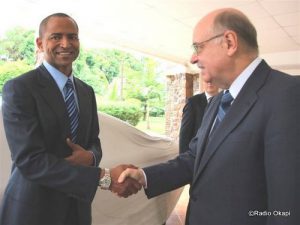 After rumors of bad health and a conviction in absentia, DRC presidential candidate Moise Katumbi gives an interview with DW. The former governor of Katanga province for 8 years until he fell out of grace with Kabila, Katumbi now expresses the need for a united opposition to President Joseph Kabila. On a so-called ‘inter-Congolese dialogue’ taking place in Kinshasa, Katumbi says “As I said, this is a monologue. We are not against participating in a dialogue. But we will not accept what this monologue is bound to impose on us”. Katumbi left DR Congo for medical treatment in May and in June was tried in absentia and sentenced to three years in jail for real estate fraud – which officially bars him from running for the presidency. (FULL INTERVIEW | Deutsche Welle. September 9 2016)
After rumors of bad health and a conviction in absentia, DRC presidential candidate Moise Katumbi gives an interview with DW. The former governor of Katanga province for 8 years until he fell out of grace with Kabila, Katumbi now expresses the need for a united opposition to President Joseph Kabila. On a so-called ‘inter-Congolese dialogue’ taking place in Kinshasa, Katumbi says “As I said, this is a monologue. We are not against participating in a dialogue. But we will not accept what this monologue is bound to impose on us”. Katumbi left DR Congo for medical treatment in May and in June was tried in absentia and sentenced to three years in jail for real estate fraud – which officially bars him from running for the presidency. (FULL INTERVIEW | Deutsche Welle. September 9 2016)
DRC: Chilling crackdown on dissent amidst election delays
The authorities in DR Congo have overseen a systematic crackdown on opponents of President Joseph Kabila’s attempt to stay in power beyond the constitutionally mandated second term, using state institutions to prevent people who oppose a prolongation of President Kabila’s term in office to organize and express themselves, Amnesty International says. Numerous opposition protests have been declared unauthorized while demonstrations in support of the ruling coalition have been held freely, facilitated by the police and local authorities. With three months left in Kabila’s term, the Independent Electoral Commission (CENI) has yet to call the elections. The report documents how the DRC government is violating rights to freedom of expression, association and peaceful assembly pushing the country into crisis. (FULL REPORT | Amnesty International. September 14 2016)
Congo elections commission petitions high court for poll delay
DR Congo’s elections commission has petitioned the Constitutional Court for a postponement of presidential elections, confirming a poll delay that threatens to create a dangerous political impasse in the country. While President Joseph Kabila’s term in office ends in December, the elections commission CENI has said the overhaul of voter rolls will last until at least next July. This week, participants in the negotiations tentatively agreed to form an interim government that includes opposition members to govern Congo until elections can be held. However, opposition figures involved in the talks rejected a proposal by the CENI that would have pushed the presidential vote back to the end of 2018. The election period was meant to open on Sept. 20, with the presidential vote originally scheduled for Nov. 27 – no new dates have been set. (FULL ARTICLE | Reuters. September 17 2016)
DR Congo at a Precipice
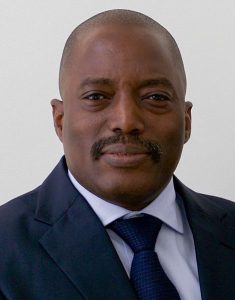 The government of DR Congo’s actions regarding its scheduled presidential election will be critical in deciding the country’s future, Human Rights Watch says. Over the past two years, government crackdown on activists and opposition party leaders, and repression of political expression of those opposed to extending Joseph Kabila’s presidency beyond the constitutional limit. Activists and opposition groups have called for nationwide protests on September 19, which has led to a spike in arrests and government repression. Human Rights Watch calls on the government and security forces to respect freedom of expression and assembly and allow peaceful demonstrations to go forward, and provides recommendations to deter further abuses and prevent a broader crisis in the coming weeks and months. (FULL STATEMENT | Human Rights Watch. September 18 2016)
The government of DR Congo’s actions regarding its scheduled presidential election will be critical in deciding the country’s future, Human Rights Watch says. Over the past two years, government crackdown on activists and opposition party leaders, and repression of political expression of those opposed to extending Joseph Kabila’s presidency beyond the constitutional limit. Activists and opposition groups have called for nationwide protests on September 19, which has led to a spike in arrests and government repression. Human Rights Watch calls on the government and security forces to respect freedom of expression and assembly and allow peaceful demonstrations to go forward, and provides recommendations to deter further abuses and prevent a broader crisis in the coming weeks and months. (FULL STATEMENT | Human Rights Watch. September 18 2016)
DR Congo opposition groups say clashes in Kinshasa leave 50 dead
Police and demonstrators have clashed in DR Congo during planned nationwide protests for September 19, with opposition groups claiming at least 50 people were killed on Monday in Kinshasa. Four people were also killed when the headquarters of three opposition parties were burned overnight. The rally, which the authorities cancelled, had been called to demand the resignation of President Joseph Kabila. Kabila’s backers and some opposition members announced an agreement on the timing of elections last week, announcing an interim government including members of the opposition would be formed and the election postponed until mid-2017. Most major opposition parties, however, have boycotted the discussions. Kabila loyalists continue to stress that it would be impossible to hold a fair poll this year, due to electoral roll limitations that could take 18 months to resolve. (FULL ARTICLE | Guardian. September 20 2016)
DR Congo opposition HQs torched after deadly protests
The headquarters of three opposition parties in the Democratic Republic of the Congo have been torched by unidentified assailants on Tuesday, one day after more than 50 people died in violent protests calling for President Kabila’s resignation. The targeted buildings included the leading opposition party, the Union for Democracy and Social Progress (UDPS), as well as the Forces of Union and Solidarity (FONUS) and the Lumumbist Progressive Movement (MLP). The national secretary of the main opposition group has blamed a “commando” unit from the government for torching the opposition headquarters buildings. (FULL ARTICLE | Al Jazeera English. September 20 2016)
Violence wracks Kinshasa as DR Congo political process falters
Congo Research Group reports on the violence in Kinshasa, where mass protests were marred by the deaths of dozens of peo
ple, the torching of political party offices, and the lynching of policemen. Political tension had been rising in the weeks leading up to the protests, while at the same time, flyers from activists groups and opposition parties began appearing across the city to call for protests. Congo Research Group includes pictures and photographs of the protests and aftermath in the report. (FULL REPORT | Congo Research Group. September 20 2016)
VIDEO: Is the DR Congo on the brink of collapse?
Opponents of President Joseph Kabila believe he is laying the groundwork to delay elections due later this year to try and remain in power beyond his two-term mandate, highlighted by recent protests, violence and deaths in Kinshasa this September. Al Jazeera English “Inside Story” discusses and analyzes the context of the current instability and conflict, and whether ‘the world has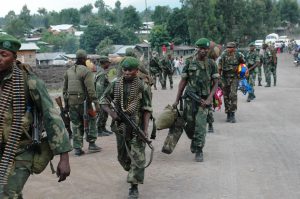 the will to pull the DRC back from the brink’. Guests include Scott Campbell, Africa section chief of UN Office of the High Commissioner for Human Rights, and Jason Stearns, Director of Congo Research Group. (FULL VIDEO DISCUSSION | Al Jazeera English. September 23 2016)
the will to pull the DRC back from the brink’. Guests include Scott Campbell, Africa section chief of UN Office of the High Commissioner for Human Rights, and Jason Stearns, Director of Congo Research Group. (FULL VIDEO DISCUSSION | Al Jazeera English. September 23 2016)
US sanctions allies of DR Congo’s President Kabila
The United States has imposed sanctions on two senior security officials who are allies of President Joseph Kabila, Gen. Gabriel Amisi Kumba and John Numbi, a former police chief. They are accused of threatening the country’s stability by suppressing the opposition, and have had their assets frozen in the US. The US treasury says Gen. Amisi had commanded units that violently suppressed opposition protests in several provinces; Mr. Numbi, meanwhile, is said to have intimidated voters to secure victories for candidates affiliated to Kabila in March’s Governors elections. US-based Human Rights Watch (HRW) welcomed the sanctions and called for more leaders to be targeted. (FULL ARTICLE | BBC News. September 30 2016)
Congo commission expects presidential vote delay to Dec 2018
The head of DR Congo’s electoral commission says that he expects the presidential election, originally scheduled for this November, to be delayed until December 2018. Commission president Corneille Nangaa told delegates at multi-party talks, intended to reach a national consensus on the election date, that the commission would finish updating the voter registry at the end of July 2017. It would then require an additional 504 days to organize the vote. The announcement is likely to stoke political tensions after over 50 people died last week in Kinshasa clashes between protesters and security forces over accusations that President Joseph Kabila is deliberately delaying the poll to cling to power. Kabila denies he is behind the delays, which he says are due to logistical and budgetary constraints. (FULL ARTICLE | Reuters. October 1 2016)
ARMED CONFLICT
South Sudan fighters get emergency UN aid in DR Congo
The UN in DR Congo has discovered more than 100 fighters loyal to South Sudan’s former vice-president Riek Machar in bad medical condition. Machar’s soldiers, who had crossed into DR Congo, were found in an area around the Garamba National Park near the border by UN peacekeepers. Many were in critical condition and were helped “on purely humanitarian grounds so that they can receive urgent medical assistance”, a UN spokesperson says. (FULL ARTICLE | BBC News. September 8 2016)
Congolese ‘Terminator’ warlord on hunger strike over prison conditions during war crimes trial
Bosco Ntaganda, a former Congolese warlord on trial at the ICC for alleged war crimes and crimes against humanity, has began a hunger strike in protest against prison conditions. According to the defence attorney, Ntaganda is protesting against a decision by ICC judges to uphold restrictions imposed on his phone calls and visitation rights. The trial began a year ago, when Ntaganda denied all charges including killing at least 800 civilians during separate attacks on a number of villages between 2002 and 2003, the recruitment of child soldiers, as well as raping women soldiers and keeping them as sex slaves. In total, he faces 18 charges of war crimes and crimes against humanity for atrocities allegedly committed by his troops in DR Congo in 2002-2003. (FULL ARTICLE | IB Times. September 14 2016)
Seven killed in eastern DR Congo by Ugandan rebels: army
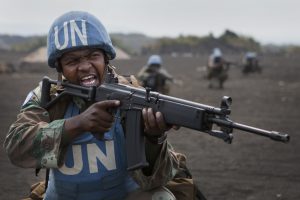 Seven people have been killed in an attack in eastern DR Congo blamed on Ugandan rebel group the Allied Democratic Forces (ADF), the Congolese army says. “The ADF killed seven people and burned down houses” in Kasinga in the Beni region, army spokesman Mak Hazukay tells reporters, adding that fighting between soldiers and the rebels was ongoing. The region around Beni is fraught with various rebel groups, violence fuelled by ethnic rivalry and disputes over the right to exploit local mining and forest resources. (FULL ARTICLE | ReliefWeb. September 22 2016)
Seven people have been killed in an attack in eastern DR Congo blamed on Ugandan rebel group the Allied Democratic Forces (ADF), the Congolese army says. “The ADF killed seven people and burned down houses” in Kasinga in the Beni region, army spokesman Mak Hazukay tells reporters, adding that fighting between soldiers and the rebels was ongoing. The region around Beni is fraught with various rebel groups, violence fuelled by ethnic rivalry and disputes over the right to exploit local mining and forest resources. (FULL ARTICLE | ReliefWeb. September 22 2016)
Deadly fighting in DRC city of Kananga kills at least 13
At least 13 people are reported killed after Kananga city, DR Congo witnessed two days of deadly violence. The city’s security forces engaged in a battle with militia fighters who were reportedly seeking revenge for their leader’s death, a tribal chief named Kamwina Nsapu from the Luba ethnic group, who was killed by the military in August. According to DRC broadcaster Radio Okapi, security forces killed at least eight members of the militia group before they fled. (FULL ARTICLE | IB Times. September 24 2016)
ECONOMY
Congo’s Copper-Export Route Re-Opened After 24-Hour Shutdown
DR Congo’s border with Zambia, the main export route for the country’s copper, re-opened September 10 after a 24-hour shutdown prompted by clashes between residents and security forces. The border was closed all day Friday after riots in the Congolese border town of Kasumbalesa left at least three dead. The violence, in which vehicles and government buildings were burned, started after criminals killed a moneychanger late Thursday, a government spokesperson says. Congo is Africa’s biggest copper producer and the world’s largest source of cobalt, almost all of which is exported via the Kasumbalesa border post. (FULL ARTICLE | Bloomberg. September 10 2016)
DR Congo Cracks Down on Gold Smugglers
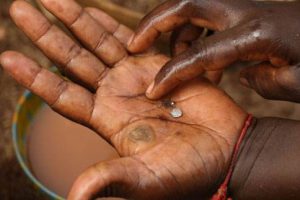 Shabunda, a territory of South Kivu, experienced a gold rush in 2014, but miners face illegal taxation and extortion from armed local groups and corrupt officials. Moreover, authorities have accused Kun Hou Mining of China of illegal operations, and had directed South Kivu to prosecute mining officials who have acted illegally. In October 2015, DR Congo suspended the firm’s activities; now, South Kivu’s Governor has allowed the company to continue operations. Authorities will now be required to have mixed teams to inspect mining sites, provide information on the location of the mines, and the presence of children and pregnant women. The move follows an exposé by non-profit Global Witness of a conflict minerals triangle linking local armed groups, artisanal miners and public officials who fabricate documents. (FULL ARTICLE | All Africa. September 24 2016)
Shabunda, a territory of South Kivu, experienced a gold rush in 2014, but miners face illegal taxation and extortion from armed local groups and corrupt officials. Moreover, authorities have accused Kun Hou Mining of China of illegal operations, and had directed South Kivu to prosecute mining officials who have acted illegally. In October 2015, DR Congo suspended the firm’s activities; now, South Kivu’s Governor has allowed the company to continue operations. Authorities will now be required to have mixed teams to inspect mining sites, provide information on the location of the mines, and the presence of children and pregnant women. The move follows an exposé by non-profit Global Witness of a conflict minerals triangle linking local armed groups, artisanal miners and public officials who fabricate documents. (FULL ARTICLE | All Africa. September 24 2016)


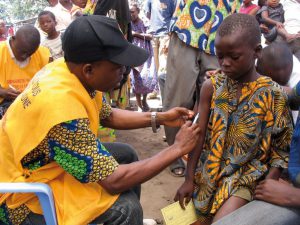 3 million in border areas to prevent transmission from neighbouring Angola. The risk of such outbreaks has risen due to urbanization and increasing mobility of the population, and this year it was especially acute because El Nino has multiplied mosquito numbers. The outbreak is the worst in decades among unprotected African populations and has killed more than 400 people. There are still 32 endemic countries in Africa, so further outbreaks can not be ruled out, including in parts of the country that have not been vaccinated recently. (
3 million in border areas to prevent transmission from neighbouring Angola. The risk of such outbreaks has risen due to urbanization and increasing mobility of the population, and this year it was especially acute because El Nino has multiplied mosquito numbers. The outbreak is the worst in decades among unprotected African populations and has killed more than 400 people. There are still 32 endemic countries in Africa, so further outbreaks can not be ruled out, including in parts of the country that have not been vaccinated recently. (